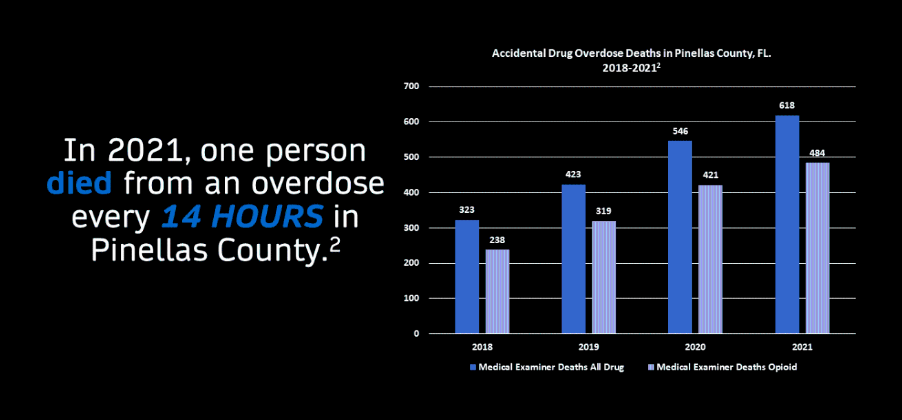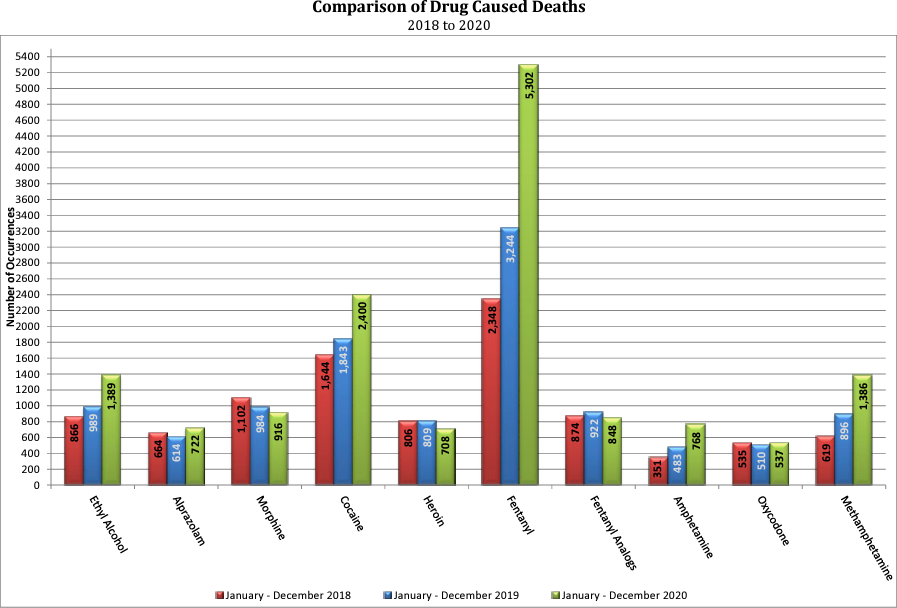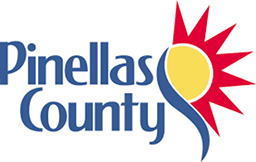Pinellas County, Florida, is no stranger to the devastating effects of the opioid epidemic that has swept across the nation. With alarming rates of opiate use and drug overdose incidents, the Pinellas County finds itself at the forefront of a battle to tackle opioid related drug abuse and create a coordinated opioid recovery network to address this public health emergency.
As local authorities, including the Pinellas County Sheriff\’s Office, the medical examiner\’s office, and the Florida Department of Health, grapple with the crisis, community partners and community members remain committed to finding a comprehensive approach to tackle opioid crisis that can save lives and offer hope to those affected by drug overdose and opioid overdose from the likes of – fentanyl, heroin, codeine, morphine, oxycodone, hydrocodone, and other abused prescription medicine.

Pinellas County Opioid Crisis Opioid Use and Overdose Statistics:
The data surrounding opiate use disorder and overdose rates in Pinellas County are deeply troubling. According to the latest available data from the Florida Department of Health, the county experienced a staggering 461 opioid-related overdose deaths in 2022 alone. This marked a significant increase from previous years and emphasized the urgent need for effective interventions.

Pinellas Sheriff Advocates for Contactless Drug Testing Amidst Fentanyl Concerns
In recent times, researchers have emphasized that accidental exposure to fentanyl presents a minimal risk to law enforcement officers. However, Sheriff Bob Gualtieri of Pinellas County remains steadfast in his belief that contactless drug testing is crucial for the safety and well-being of his personnel.
While studies have indicated that the likelihood of harm resulting from incidental fentanyl exposure is low, Sheriff Gualtieri of Pinellas County, FL asserts that taking precautions and having a strategic plan stops deaths in the county and protects his officers and community members.
Recognizing the potential dangers associated with fentanyl, he has implemented contactless testing protocols to safeguard his officers and ensure their peace of mind.
Rather than dismissing the concerns outright, Sheriff Gualtieri believes in prioritizing the safety of his personnel by adopting this new program of proactive measures. By utilizing contactless drug testing methods, he aims to minimize any potential risks associated with accidental exposure to opioids or fentanyl during the course of duty.
Sheriff’s Commitment to Officer Safety
In light of the sheriff’s commitment to officer safety, thousands of dollars have been allocated to fund the implementation of contactless drug testing in Pinellas County. While some researchers argue that the fears surrounding fentanyl exposure may be overstated, Sheriff Gualtieri remains resolute in his mission to prioritize the well-being of his officers.
It is important to note that law enforcement agencies across the nation have been grappling with the opioid epidemic and the issue of fentanyl exposure, and opinions on the matter vary. While researchers continue to study and assess the risks associated with incidental fentanyl contact, Sheriff Gualtieri’s proactive approach aims to provide a sense of security for his personnel as they carry out their duties.
Sheriff Bob Gualtieri’s decision to advocate for contactless drug testing to the state health leaders in Pinellas County reflects his unwavering commitment to protecting the safety and well-being of his officers.
Despite differing opinions on the extent of risk posed by accidental fentanyl exposure, the sheriff’s prioritization of officer security underscores the importance of proactive measures in law enforcement. As the discussion surrounding fentanyl exposure continues, it remains imperative to strike a balance between comprehensive research and taking precautions to ensure the welfare of those who protect and serve our communities.
Sheriff’s Office has Joined Forces with Community Partners
The Pinellas County Sheriff’s Office has joined forces with community partners to address education and prevention of drug abuse. They continue to strive to reduce overdose deaths and utilize the Crime Prevention and Community Awareness department to partner with those and encourage the ability to develop a strategic plan that efficiently guides community members and offers resources to confront the opioid epidemic.
NOPE
The Pinellas County Sheriff’s Office partnered with families that suffered the loss of a relative from the use of illicit and/or prescription drugs to establish a NOPE Pinellas Chapter. This partnership is to educate communities about the dangerous consequences of abusing illicit and prescription drugs.
Operation PAR
In addition they work with Operation PAR. Operation PAR provides integrated addiction and mental health services for all ages. Its core mission is to strengthen communities by caring for families and individuals impacted by substance abuse and mental illness, providing the skills and resources to battle the impact of those diseases.
Ekerd Community Alternatives
Eckerd Community Alternatives community facilitators provide information to callers about available resources in Pinellas County including counseling, drug treatment, mental health housing, clothing, food, utility assistance, and 2-1-1.

Medical Examiner: Documenting the Grim Reality
The Pinellas County Office of the Medical Examiner plays a vital role in documenting and analyzing the impact of the opioid epidemic. Through comprehensive toxicology screenings and thorough investigations of overdoses, the Medical Examiner’s Office provides critical insights into the specific drugs involved in overdose cases. This information allows law enforcement and healthcare professionals to better understand trends and tailor their response accordingly.
Pinellas County opioid overdose deaths are led by fentanyl. This one substance has caused more accidental drug overdose cases than any other drug.
Florida Department of Health: Promoting Prevention and Treatment
The Florida Department of Health plays a crucial role in addressing the opioid related drug abuse in Pinellas County and they are partnering to prevent opioid deaths. Instilling the importance of prevention and education initiatives. “Early intervention and prevention efforts are key to reducing the impact of opioid addiction. Our goal is to raise awareness about the dangers of opioid misuse and promote evidence-based treatment options.”
The Department of Health works closely with local organizations and healthcare providers to increase access to treatment, including medication-assisted treatment programs, counseling services, and harm reduction strategies. By promoting collaboration and offering resources to both individuals struggling with addiction and their families, the Department of Health aims to mitigate the devastating effects of the opioid crisis in Pinellas County.

Community Action and Hope for the Future:
Pinellas County residents have come together to combat the opioid epidemic, recognizing that it is not a problem that can be solved by a single agency or organization alone. Local community groups, such as support networks, recovery centers, and advocacy organizations, provide critical support and resources to individuals affected by addiction.
Free Naloxone (Narcan) Nasal Spray kits
The Florida Department of Health in Pinellas County (DOH-Pinellas) is pleased to announce the availability of free Naloxone (Narcan) Nasal Spray kits. These lifesaving kits have the potential to prevent thousands of drug abuse deaths across the state. Naloxone is accessible to individuals who use drugs, have a history of drug use, are at risk of experiencing an overdose, as well as friends, family members, and others who may witness an overdose.
Increasing access to naloxone plays a critical role in combating the opioid epidemic. By providing naloxone to the public, we can help prevent overdose deaths in Florida.
Naloxone is a medication that swiftly reverses the effects of an overdose from opiates, restoring breathing and consciousness within minutes of administration to an individual who has overdosed.
Narcan can be administered by a bystander, even if they are not a healthcare professional, before emergency medical assistance arrives. However, it is important to note that naloxone is not a substitute for professional medical care. If an opiate overdose is suspected, individuals should immediately call 911 before administering naloxone.
To be eligible for a naloxone kit from DOH-Pinellas, individuals must meet the following criteria:
- Must be 18 years old or older
- Individuals at risk of experiencing an opioid overdose
- Caregivers who may witness an opioid overdose, or others likely to experience or witness an opioid overdose
Naloxone kits are available at the following locations from 8 a.m. to 5 p.m., Monday through Friday:
- St. Petersburg: 205 Dr. Martin Luther King Jr. St. N, St. Petersburg
- Pinellas Park: 6350 76th Ave. N., Pinellas Park
- Mid County: 8751 Ulmerton Rd., Largo
- Clearwater: 310 N. Myrtle Ave., Clearwater
- Tarpon Springs: 301 S. Disston Ave., Tarpon Springs (Monday, Wednesday, and Friday only)
For more information on naloxone in Pinellas County, please call 727-824-6900.
Naloxone kits are provided free of charge, and no appointment is necessary. Individuals receiving naloxone will also receive educational materials, referrals, and connections for substance abuse intervention.
To learn more about naloxone and if you or someone you know is struggling with substance abuse, please visit iSaveFL for valuable resources and information.
The Florida Department of Health in Pinellas County is committed to combating the opioid crisis and promoting the health and well-being of our community.
Sources:
https://www.pcsoweb.com/narcotics-investigations
https://storymaps.arcgis.com/stories/57761bafd0aa459697ac4ebaf4aecb4f
- Belleair
- Belleair Bluffs
- Clearwater
- Dunedin
- Gulfport
- Indian Rocks Beach
- Largo
- Madeira Beach
- Oldsmar
- Pinellas Park
- Safety Harbor
- Seminole
- South Pasadena
- St. Pete Beach
- St. Petersburg
- Treasure Island
- Belleair Shore
- Indian Shores
- Kenneth City
- North Redington Beach
- Redington Beach
- Redington Shores
- Bardmoor
- Baskin
- Bay Pines
- Crystal Beach
- Curlew
- Bear Creek
- East Lake
- Feather Sound
- Gandy
- Greenbriar
- Harbor Bluffs
- Highpoint
- Innisbrook
- Lealman
- Oakhurst
- Ozona
- Palm Harbor
- Ridgecrest
- St. George
- Seminole Park
- South Highpoint
- Tierra Verde
- Wall Springs
- Walsingham
- West Lealman
